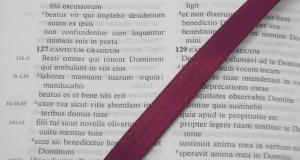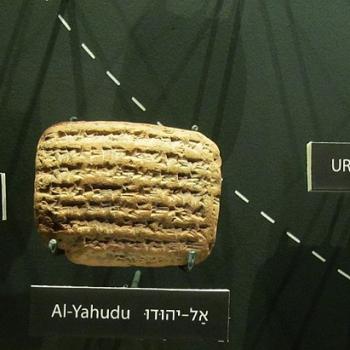The Latin Bible is full of surprising, sometimes peculiar, sometimes humorous fun details to explore. Here in this two-part post, I will package as many of them together as possible, for the benefit of those who have never had time to find them, and/or for those who have never had Latin. If you haven’t, never fear – no advance knowledge of Latin needed.

Hanging out with Saint Jerome in his Latin version of the Bible has given me the chance to get to know him, as I watch how he renders the original text. I find that he often translates the Hebrew Bible more accurately than the Greek translators of 280 BCE (who were Jewish), possibly because he learned his Hebrew in Bethlehem rather than in Egypt. I also see that his version bears witness to a Hebrew text that is closer to the Massoretic or standard Hebrew text than the Hebrew original on which the Greek version is based. Jerome’s version gives us a glimpse of what a proto-Massoretic text looked like in 400 AD. I truly appreciate what Jerome and those who preceded him have given us!
In an age where large numbers of Latin-speaking Christians had their own private translation of the New Testament, with all sorts of variations of spelling, grammar, vocabulary, and textual originals, Jerome deserves a lot of credit for wading through the multiplicity of Old Latin texts and creating one standard version. One example would be where the angel urges Joseph to take Mary as his wife. Some Old Latin copies read uxorem, the standard word for “wife,” but some manuscripts say coniugem, “mate,” someone with whom one “mates” or “conjugates,” a word that implies a sexual relationship. Those translators who used the term uxorem seem to reject any notion of such a relationship between Joseph and Mary, even after Jesus is born. For his Vulgate, Jerome chose coniugem.
Jerome often puts explanatory notes that are not in the original Hebrew, straight into the text. In Deuteronomy 23:2, he quotes the Hebrew term mamzer (illegitimate child) by simply transliterating it, and then adding hoc est, de scortō natus (“that is, one who is born from a harlot”). In Joshua 3:16, he says that the waters of the Jordan drained away into mare Solitudinis, quod nunc vocatur Mortuum (“the Sea of the Desert, which is now called [Sea] of the Dead”). He explains the name Kiriath-Jearim in Joshua 15:9 by adding id est urbs silvārum, “that is, City of Forests.” He identifies Ararat as “Armenia” (Genesis 8:4). And 19 times he uses the Latin calendar term kalendae (“first of the month”) for “new moon.”
Jerome almost never uses the noun amor or the verb amāre to refer to either the love of God (three times) or love between believers (0 times); the noun he uses is caritas (from which we get “charity” in 1 Corinthians 13), and the verb he consistently uses is dīligere.
Jerome also uses the noun uterus in ways that are typical of Latin but are foreign to our ears. In Genesis 15:4, God speaks to Abraham of an heir who will be born de uterō tuō, “from your (Abraham’s!) uterus” (presumably meaning “body”). Likewise, David refers in 2 Samuel 16:11 to the son who came forth de uterō meō, “from my body.” The most surprising example is Jonah praying de uterō piscis, “from the belly of the fish” (Jonah 2:1). And in a large number of texts where we find the English term “womb,” we find the Latin word vulva rather than uterus (usually as the object of the verb “to open”); the two Latin words are even paired as synonyms in Job 3:11, Psalm 58:4 (Hebrew), Isaiah 46:3, and Jeremiah 1:5.
It is the Latin version that specifies whether the aetos crying woe on the earth in Revelation 8:13 is an eagle or a vulture (like the Hebrew nesher, aetos can mean either); the Latin tradition (whether it is correct, who knows?) says aquila, which can only mean “eagle”, not a vultur. The Latin identifies the almug wood of 1 Kings 10:11-12 as thyine or citron wood, the most expensive wood of Roman times. And it tells us in 1 Kings 15:13 that Asa removed Maacah from being queen mother because she had made a most obscene (turpissimum) image of Priapus. (Mom! How disgusting can you get?)
Stay tuned for more surprising, humorous sound bites from the Latin Bible next time!















